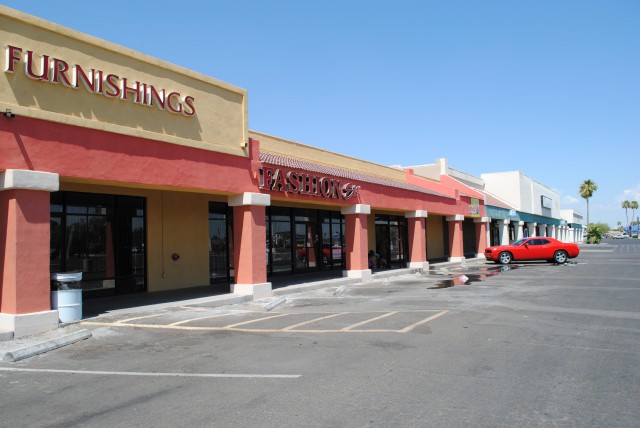
The purchase of the briefcase-sized shoulder bags
means that another one of Katchi’s customers, mostly Latino immigrants,
is packing to leave the state before what is touted as the nation’s
toughest law against illegal immigrants takes effect
Katchi’s store isn’t the only business suffering.
The vast shopping center that holds his small shop is almost empty. The
Food City supermarket closed this spring. Then the furniture shop. Then
the pizzeria.
The giant apartment complex across the street, once brimming with tenants, is two-thirds vacant. Katchi is behind on his rent.
“The business is broken,” said Katchi, who has
operated his shop at this intersection for 14 years. “After the 29th of
July, what happens? Maybe I have to close the store.”
For the last 20 years,
has been one of the fastest-growing states in the nation. It depends on
an expanding population to power its economy, which relies heavily on
the construction of new houses.
At the corner of 43rd and Thomas, it’s hard to determine how much of the neighborhood’s woes stem from
immigration laws and how much from the state’s economy, battered by a
once red-hot housing marked that cooled. Katchi’s revenues were already
sagging before
In adopting the legislation the state embarked on a
grand experiment — trying to drive out hundreds of thousands of its
residents by what the law calls “attrition through enforcement.”
The law requires police to check the immigration
status of people they lawfully stop and also suspect are in the country
illegally. Civil rights groups and the Obama administration have sued
to stop the law from taking effect, and a federal judge heard arguments
in the case Thursday.
The departure of illegal immigrants, proponents of SB 1070 argue, can only help
“As long as there are legal
residents scrambling for jobs, a slow, steady attrition of low-wage,
government-educated illegal aliens is a beneficial facet of the law,”
said
But it’s hard to get solid data on illegal immigrants and the economy.
A 2007 report from the Congressional Budget Office
that reviewed 29 studies — but not ones from advocacy groups like FAIR
— found that illegal immigrants place a “modest” burden on state
budgets.
Even people whose families use more government services than they pay in taxes still help the economy, said
When immigrants leave, Gans said, “stores experience
dramatic drops in sales. Apartment owners who rent to immigrants have
high vacancy rates and risk losing their buildings. Legal workers or
renters or consumers don’t generally step in quickly enough to prevent
these businesses from experiencing real additional hardship.”
At 43rd and Thomas, such short-term economic perils are no abstraction.
“If people don’t come here, I don’t make money and I don’t pay taxes,” Katchi said.
The junction of two six-lane thoroughfares, 43rd and Thomas lies in the heart of immigrant
No one has measured the effect of SB 1070 on businesses, or the number of immigrants it has prompted to leave
But merchants say the repercussions are clear — not just in how it’s
prompted many families to leave the state, but scared others enough to
curtail their regular activities.
“The economy’s already bad, but on top of it (SB 1070) is like a bullet in the head to us,” said Osameh Odeh, 35, whose
Odeh has laid off workers and doesn’t pay his
utility bills until the day they come due. He’s not sure he can stay
open and notes that the effect spreads well beyond the rough-and-tumble
streets of Maryvale. A resident of the middle-class suburb of Gilbert,
Odeh has cut back his purchases at home.
“If my son wants a toy, I can’t afford it,” he said.
his ability to spend money at home hinges on the success of his
Salvadoran restaurant at 43rd and Thomas, La Pupusa Loca. He just
closed his neighboring bakery last week and has laid off six employees.
His daughters, both doctors, now come in on weekends to work the floor.
“People used to feel secure here; they’d come in,
spend two, three hours,” said Vela, sitting in his mostly empty
restaurant, lined with mirrors and a full bar. “Now they eat and run.”
He recalled one recent evening when two families were eating dinner. Their cell phones rang. Friends were alerting them that
— had sent deputies to raid a nearby car wash. The families quickly
asked for their checks, paid and ran from the restaurant.
Last month, a bank foreclosed on a rental house Vela
owns nearby; it’s one of three vacant homes on a short block. The
families there told Vela that the breadwinners had been arrested by
Arpaio’s deputies, and they could no longer pay the rent.
Some of those leaving are U.S. citizens or legal
residents who believe that all Latinos in the state are already being
targeted by police. Vela, for example, said he’s been stopped by police
while driving to his restaurant “more times than I can count.”
23 years ago, expects she will close the shop next month. In the small
space, crammed with phone cards, mattresses and purses, Davenport said
that if the law takes effect she will probably abandon
SB 1070’s supporters say legal residents like Davenport have nothing to fear from the law, which bans racial profiling.
But earlier this year, Davenport said, she was
stopped by a police officer on her way to work. She said the officer
did not believe she was in the country legally and warned that he could
refer her to immigration authorities for deportation.
“They don’t want Mexicans,” she said. “So we’ll leave.”
———
(c) 2010, Los Angeles Times.
Visit the Los Angeles Times on the Internet at http://www.latimes.com/
Distributed by McClatchy-Tribune Information Services.














